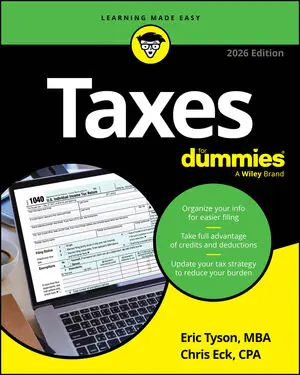This builtin is not currently supported: Animation
- Book & Article Categories

- Collections

- Custom Solutions
 Main Menu
Main MenuBook & Article Categories
 Main Menu
Main MenuBook & Article Categories
Eric Tyson
Eric Tyson, MBA, is a financial counselor, syndicated columnist, and the author of bestselling For Dummies books on personal finance, taxes, home buying, and investing.
Articles & Books From Eric Tyson
Cheat Sheet / Updated 01-27-2026
Taxes are a part of life. Love them or hate them (okay, no one loves paying them!), everyone has to deal with them. The Taxes For Dummies Cheat Sheet is here to help guide you through tax challenges with some straightforward strategies.Important IRS informationIRS Tax Forms and Publications. Only the most commonly used forms come with your annual IRS 1040 booklet.
Give Uncle Sam what he's legally owed—and not a penny more!—with this trusted guide to your US taxes. Taxes For Dummies: 2026 Edition is your personal antidote to the confusing and frustrating chaos of the United States tax system. It's a straightforward and expert walkthrough of how to file your tax return while maximizing every last deduction and credit that you're legally entitled to.
Move confidently into your retirement planning years with financial advice from a bestselling personal finance advisor Retirement is lasting longer than it ever has. And a little bit of careful planning can ensure that you spend your retirement—and the years leading up to it—in comfort and financial security.
Your friendly guide to financial success Managing your money and making informed financial decisions for you and your family can be challenging. You're not alone if you find it difficult to understand tax, plan for retirement, create a workable budget, or protect your wealth from unexpected events. This edition of Personal Finance For Dummies, tailored for a UK audience, offers an easy-to-read guide to improving your financial situation, no matter your income level.
Cheat Sheet / Updated 07-21-2025
Stocks, bonds, mutual funds, exchange-traded funds, and property — the allure of earning high returns from these investments gets people’s attention. However, people also hear about the risks involved in chasing those greater potential returns when investing.Before you set out to invest, you must get your financial house in order and increase your knowledge to make your best investing decisions.
Upgrade your financial future and stay ahead of the economic curve This latest UK edition of Investing For Dummies is packed with up-to-date financial insights, covering the newest trends and developments that are reshaping the investment landscape. This comprehensive and beginner-friendly guidebook will help you build a robust investment portfolio in all economies and monitor its ongoing performance, for financial security you can rely upon.
Learn to make the simple and sound financial decisions that set you up for long-term success When you've officially begun “adulting” and it's time to make big financial decisions, Personal Finance In Your 20s & 30s For Dummies offers step-by-step advice on building a foundation for your financial futures. Bestselling author and money management guru Eric Tyson shares simple guidance on budgeting, investing, insurance, housing, and more, walking you through how to make the decisions you'll need to make to set yourself up for the rest of your life.
Consejos sólidos de gestión personal del dinero con perspectivas para el mundo actual Finanzas Personales para Dummies ha estado abordando la alfabetización financiera durante 30 años. Esta décima edición continúa proporcionando los consejos que han ayudado a millones a volverse financieramente alfabetizados, mientras aborda problemas financieros actuales.
Your to-the-point guide on the essentials of managing your finances The first step in becoming a better personal financial manager is understanding the pillars of personal finance. Financial Literacy Essentials For Dummies is your cheat sheet on understanding how to better manage your finances. Distilled down to the essentials, this book makes it easy for anyone to learn the basics of managing money.
The quick-and-easy guide to unlocking the potential of your income Building Wealth Essentials For Dummies is your go-to guide for learning the key concepts involved in growing your finances, no matter where you're starting. Small and value priced for the budget conscious, this book breaks down investing, taxes, retirement planning, and all the other wealth-building fundamentals you need to know.











